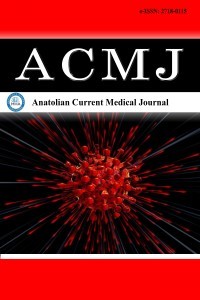
Anatolian Current Medical Journal
Yazarlar: ["Leyla KUTLUCAN", "Ömer Faruk ALTAŞ", "Nimet ŞENOĞLU"]
Konular:-
DOI:10.38053/acmj.1232318
Anahtar Kelimeler:COVID-19,Caesarean section,Regional anaesthesia,American Society of Anesthesiologists scores,Postoperative complications
Özet: Aim: In the literature, studies comparing the preferred anesthesia methods and related parameters in obstetric anesthesia during the pandemic period with the pre-pandemic period are limited. I n this study, primarily in patients who gave birth by cesarean section before and during the COVID-19 (Coronavirus disease 19) pandemic It was aimed to evaluate the anesthesia method, postoperative complications, length of hospital stay, clinical urgency of the patients and ASA (American Society of Anesthesiologists) scores. In addition, in patients who underwent cesarean section with positive and negative PCR (Polymerase Chain Reaction) tests during the COVID-19 pandemic It was aimed to evaluate the anesthesia method, postoperative complications, hospital stay, clinical urgency of the cases and ASA scores. Material and Method: In this retrospective, single-center study, we noted down and compared types of cesarean section (elective or emergency), anesthesia techniques (spinal, spinal+epidural, or general anesthesia), and patients’ ages, ASA scores, PCR test results, postoperative complications (e.g., pneumonia, excessive postpartum bleeding), and lengths of hospital stay. Results: We carried out this study with the data of 2,406 women, 1,458 of whom gave birth before the pandemic. The findings revealed that the rate of developing complications, the length of hospital stay, the number of patients with an ASA score of 3 and above, and the use of spinal anesthesia significantly increased during the pandemic. Moreover, 182 women were COVID-19-positive among a total of 948 applicants during the pandemic. Although the ASA scores and complication rates were significantly higher among those with a positive PCR test result, the length of hospital stay was similar between the patients by their PCR test results. Conclusion: Our findings revealed a significant decrease in spinal + epidural anesthesia, which was frequently adopted before, in cases with cesarean section during the pandemic. Spinal anesthesia was mostly used alone. Despite increased complication rates in PCR-positive patients with higher ASA scores undergoing cesarean section, we concluded no significant change in the length of hospital stay. In cases of increased risk of infection and transmission (e.g., pandemic), neuraxial blocks may be preferred as an anesthesia technique to minimize the risk of infection in emergency obstetric operations. It should also be noted that the risk of developing postoperative complications always be high during pandemics.